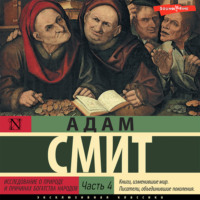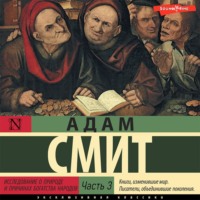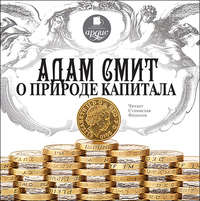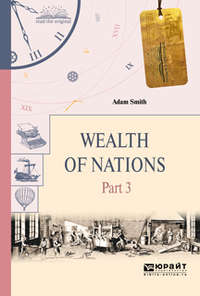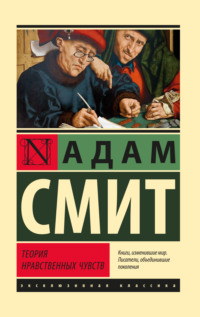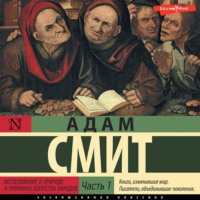 полная версия
полная версияAn Inquiry Into the Nature and Causes of the Wealth of Nations
The policy of ancient Egypt, too, and that of the Gentoo government of Indostan, seem to have favoured agriculture more than all other employments.
Both in ancient Egypt and Indostan, the whole body of the people was divided into different casts or tribes each of which was confined, from father to son, to a particular employment, or class of employments. The son of a priest was necessarily a priest; the son of a soldier, a soldier; the son of a labourer, a labourer; the son of a weaver, a weaver; the son of a tailor, a tailor, &c. In both countries, the cast of the priests holds the highest rank, and that of the soldiers the next; and in both countries the cast of the farmers and labourers was superior to the casts of merchants and manufacturers.
The government of both countries was particularly attentive to the interest of agriculture. The works constructed by the ancient sovereigns of Egypt, for the proper distribution of the waters of the Nile, were famous in antiquity, and the ruined remains of some of them are still the admiration of travellers. Those of the same kind which were constructed by the ancient sovereigns of Indostan, for the proper distribution of the waters of the Ganges, as well as of many other rivers, though they have been less celebrated, seem to have been equally great. Both countries accordingly, though subject occasionally to dearths, have been famous for their great fertility. Though both were extremely populous, yet, in years of moderate plenty, they were both able to export great quantities of grain to their neighbours.
The ancient Egyptians had a superstitious aversion to the sea; and as the Gentoo religion does not permit its followers to light a fire, nor consequently to dress any victuals, upon the water, it, in effect, prohibits them from all distant sea voyages. Both the Egyptians and Indians must have depended almost altogether upon the navigation of other nations for the exportation of their surplus produce; and this dependency, as it must have confined the market, so it must have discouraged the increase of this surplus produce. It must have discouraged, too, the increase of the manufactured produce, more than that of the rude produce. Manufactures require a much more extensive market than the most important parts of the rude produce of the land. A single shoemaker will make more than 300 pairs of shoes in the year; and his own family will not, perhaps, wear out six pairs. Unless, therefore, he has the custom of, at least, 50 such families as his own, he cannot dispose of the whole produce of his own labour. The most numerous class of artificers will seldom, in a large country, make more than one in 50, or one in a 100, of the whole number of families contained in it. But in such large countries, as France and England, the number of people employed in agriculture has, by some authors, been computed at a half, by others at a third, and by no author that I know of, at less than a fifth of the whole inhabitants of the country. But as the produce of the agriculture of both France and England is, the far greater part of it, consumed at home, each person employed in it must, according to these computations, require little more than the custom of one, two, or, at most, of four such families as his own, in order in dispose of the whole produce of his own labour. Agriculture, therefore, can support itself under the discouragement of a confined market much better than manufactures. In both ancient Egypt and Indostan, indeed, the confinement of the foreign market was in some measure compensated by the conveniency of many inland navigations, which opened, in the most advantageous manner, the whole extent of the home market to every part of the produce of every different district of those countries. The great extent of Indostan, too, rendered the home market of that country very great, and sufficient to support a great variety of manufactures. But the small extent of ancient Egypt, which was never equal to England, must at all times, have rendered the home market of that country too narrow for supporting any great variety of manufactures. Bengal accordingly, the province of Indostan which commonly exports the greatest quantity of rice, has always been more remarkable for the exportation of a great variety of manufactures, than for that of its grain. Ancient Egypt, on the contrary, though it exported some manufactures, fine linen in particular, as well as some other goods, was always most distinguished for its great exportation of grain. It was long the granary of the Roman empire.
The sovereigns of China, of ancient Egypt, and of the different kingdoms into which Indostan has, at different times, been divided, have always derived the whole, or by far the most considerable part, of their revenue, from some sort of land tax or land rent. This land tax, or land rent, like the tithe in Europe, consisted in a certain proportion, a fifth it is said, of the produce of the land, which was either delivered in kind, or paid in money, according to a certain valuation, and which, therefore, varied from year to year, according to all the variations of the produce. It was natural, therefore, that the sovereigns of those countries should be particularly attentive to the interests of agriculture, upon the prosperity or declension of which immediately depended the yearly increase or diminution of their own revenue.
The policy of the ancient republics of Greece, and that of Rome, though it honoured agriculture more than manufactures or foreign trade, yet seems rather to have discouraged the latter employments, than to have given any direct or intentional encouragement to the former. In several of the ancient states of Greece, foreign trade was prohibited altogether; and in several others the employments of artificers and manufacturers were considered as hurtful to the strength and agility of the human body, as rendering it incapable of those habits which their military and gymnastic exercises endeavoured to form in it, and as thereby disqualifying it, more or less, for undergoing the fatigues and encountering the dangers of war. Such occupations were considered as fit only for slaves, and the free citizens of the states were prohibited from exercising them. Even in those states where no such prohibition took place, as in Rome and Athens, the great body of the people were in effect excluded from all the trades which are now commonly exercised by the lower sort of the inhabitants of towns. Such trades were, at Athens and Rome, all occupied by the slaves of the rich, who exercised them for the benefit of their masters, whose wealth, power, and protection, made it almost impossible for a poor freeman to find a market for his work, when it came into competition with that of the slaves of the rich. Slaves, however, are very seldom inventive; and all the most important improvements, either in machinery, or in the arrangement and distribution of work, which facilitate and abridge labour have been the discoveries of freemen. Should a slave propose any improvement of this kind, his master would be very apt to consider the proposal as the suggestion of laziness, and of a desire to save his own labour at the master's expense. The poor slave, instead of reward would probably meet with much abuse, perhaps with some punishment. In the manufactures carried on by slaves, therefore, more labour must generally have been employed to exercise the same quantity of work, than in those carried on by freemen. The work of the former must, upon that account, generally have been dearer than that of the latter. The Hungarian mines, it is remarked by Mr. Montesquieu, though not richer, have always been wrought with less expense, and therefore with more profit, than the Turkish mines in their neighbourhood. The Turkish mines are wrought by slaves; and the arms of those slaves are the only machines which the Turks have ever thought of employing. The Hungarian mines are wrought by freemen, who employ a great deal of machinery, by which they facilitate and abridge their own labour. From the very little that is known about the price of manufactures in the times of the Greeks and Romans, it would appear that those of the finer sort were excessively dear. Silk sold for its weight in gold. It was not, indeed, in those times an European manufacture; and as it was all brought from the East Indies, the distance of the carriage may in some measure account for the greatness of the price. The price, however, which a lady, it is said, would sometimes pay for a piece of very fine linen, seems to have been equally extravagant; and as linen was always either an European, or at farthest, an Egyptian manufacture, this high price can be accounted for only by the great expense of the labour which must have been employed about it, and the expense of this labour again could arise from nothing but the awkwardness of the machinery which is made use of. The price of fine woollens, too, though not quite so extravagant, seems, however, to have been much above that of the present times. Some cloths, we are told by Pliny44, dyed in a particular manner, cost a hundred denarii, or L.3 6s. 8d. the pound weight. Others, dyed in another manner, cost a thousand denarii the pound weight, or L.33 6s. 8d. The Roman pound, it must be remembered, contained only twelve of our avoirdupois ounces. This high price, indeed, seems to have been principally owing to the dye. But had not the cloths themselves been much dearer than any which are made in the present times, so very expensive a dye would not probably have been bestowed upon them. The disproportion would have been too great between the value of the accessory and that of the principal. The price mentioned by the same author45, of some triclinaria, a sort of woollen pillows or cushions made use of to lean upon as they reclined upon their couches at table, passes all credibility; some of them being said to have cost more than L.30,000, others more than L.300,000. This high price, too, is not said to have arisen from the dye. In the dress of the people of fashion of both sexes, there seems to have been much less variety, it is observed by Dr. Arbuthnot, in ancient than in modern times; and the very little variety which we find in that of the ancient statues, confirms his observation. He infers from this, that their dress must, upon the whole, have been cheaper than ours; but the conclusion does not seem to follow. When the expense of fashionable dress is very great, the variety must be very small. But when, by the improvements in the productive powers of manufacturing art and industry, the expense of any one dress comes to be very moderate, the variety will naturally be very great. The rich, not being able to distinguish themselves by the expense of any one dress, will naturally endeavour to do so by the multitude and variety of their dresses.
The greatest and most important branch of the commerce of every nation, it has already been observed, is that which is carried on between the inhabitants of the town and those of the country. The inhabitants of the town draw from the country the rude produce, which constitutes both the materials of their work and the fund of their subsistence; and they pay for this rude produce, by sending back to the country a certain portion of it manufactured and prepared for immediate use. The trade which is carried on between these two different sets of people, consists ultimately in a certain quantity of rude produce exchanged for a certain quantity of manufactured produce. The dearer the latter, therefore, the cheaper the former; and whatever tends in any country to raise the price of manufactured produce, tends to lower that of the rude produce of the land, and thereby to discourage agriculture. The smaller the quantity of manufactured produce, which any given quantity of rude produce, or, what comes to the same thing, which the price of any given quantity of rude produce, is capable of purchasing, the smaller the exchangeable value of that given quantity of rude produce; the smaller the encouragement which either the landlord has to increase its quantity by improving, or the farmer by cultivating the land. Whatever, besides, tends to diminish in any country the number of artificers and manufacturers, tends to diminish the home market, the most important of all markets, for the rude produce of the land, and thereby still further to discourage agriculture.
Those systems, therefore, which preferring agriculture to all other employments, in order to promote it, impose restraints upon manufactures and foreign trade, act contrary to the very end which they propose, and indirectly discourage that very species of industry which they mean to promote. They are so far, perhaps, more inconsistent than even the mercantile system. That system, by encouraging manufactures and foreign trade more than agriculture, turns a certain portion of the capital of the society, from supporting a more advantageous, to support a less advantageous species of industry. But still it really, and in the end, encourages that species of industry which it means to promote. Those agricultural systems, on the contrary, really, and in the end, discourage their own favourite species of industry.
It is thus that every system which endeavours, either, by extraordinary encouragements to draw towards a particular species of industry a greater share of the capital of the society than what would naturally go to it, or, by extraordinary restraints, to force from a particular species of industry some share of the capital which would otherwise be employed in it, is, in reality subversive of the great purpose which it means to promote. It retards, instead of accelerating, the progress of the society towards real wealth and greatness; and diminishes, instead of increasing, the real value of the annual produce of its land and labour.
All systems, either of preference or of restraint, therefore, being thus completely taken away, the obvious and simple system of natural liberty establishes itself of its own accord. Every man, as long as he does not violate the laws of justice, is left perfectly free to pursue his own interest his own way, and to bring both his industry and capital into competition with those of any other man, or order of men. The sovereign is completely discharged from a duty, in the attempting to perform which he must always be exposed to innumerable delusions, and for the proper performance of which, no human wisdom or knowledge could ever be sufficient; the duty of superintending the industry of private people, and of directing it towards the employments most suitable to the interest of the society. According to the system of natural liberty, the sovereign has only three duties to attend to; three duties of great importance, indeed, but plain and intelligible to common understandings: first, the duty of protecting the society from violence and invasion of other independent societies; secondly, the duty of protecting, as far as possible, every member of the society from the injustice or oppression of every other member of it, or the duty of establishing an exact administration of justice; and, thirdly, the duty of erecting and maintaining certain public works, and certain public institutions, which it can never be for the interest of any individual, or small number of individuals to erect and maintain; because the profit could never repay the expense to any individual, or small number of individuals, though it may frequently do much more than repay it to a great society.
The proper performance of those several duties of the sovereign necessarily supposes a certain expense; and this expense again necessarily requires a certain revenue to support it. In the following book, therefore, I shall endeavour to explain, first, what are the necessary expenses of the sovereign or commonwealth; and which of those expenses ought to be defrayed by the general contribution of the whole society; and which of them, by that of some particular part only, or of some particular members of the society; secondly, what are the different methods in which the whole society may be made to contribute towards defraying the expenses incumbent on the whole society; and what are the principal advantages and inconveniences of each of those methods; and thirdly, what are the reasons and causes which have induced almost all modern governments to mortgage some part of this revenue, or to contract debts; and what have been the effects of those debts upon the real wealth, the annual produce of the land and labour of the society. The following book, therefore, will naturally be divided into three chapters.
BOOK V.
OF THE REVENUE OF THE SOVEREIGN OR COMMONWEALTH
CHAP. I.
OF THE EXPENSES OF THE SOVEREIGN OR COMMONWEALTH
PART I.
Of the Expense of Defence
The first duty of the sovereign, that of protecting the society from the violence and invasion of other independent societies, can be performed only by means of a military force. But the expense both of preparing this military force in time of peace, and of employing it in time of war, is very different in the different states of society, in the different periods of improvement.
Among nations of hunters, the lowest and rudest state of society, such as we find it among the native tribes of North America, every man is a warrior, as well as a hunter. When he goes to war, either to defend his society, or to revenge the injuries which have been done to it by other societies, he maintains himself by his own labour, in the same manner as when he lives at home. His society (for in this state of things there is properly neither sovereign nor commonwealth) is at no sort of expense, either to prepare him for the field, or to maintain him while he is in it.
Among nations of shepherds, a more advanced state of society, such as we find it among the Tartar and Arabs, every man is, in the same manner a warrior. Such nations have commonly no fixed habitation, but live either in tents, or in a sort of covered wagons, which are easily transported from place to place. The whole tribe, or nation, changes its situation according to the different seasons of the year, as well as according to other accidents. When its herds and flocks have consumed the forage of one part of the country, it removes to another, and from that to a third. In the dry season, it comes down to the banks of the rivers; in the wet season, it retires to the upper country. When such a nation goes to war, the warriors will not trust their herds and flocks to the feeble defence of their old men, their women and children; and their old men, their women and children, will not be left behind without defence, and without subsistence. The whole nation, besides, being accustomed to a wandering life, even in time of peace, easily takes the field in time of war. Whether it marches as an army, or moves about as a company of herdsmen, the way of life is nearly the same, though the object proposed by it be very different. They all go to war together, therefore, and every one does as well as he can. Among the Tartars, even the women have been frequently known to engage in battle. If they conquer, whatever belongs to the hostile tribe is the recompence of the victory; but if they are vanquished, all is lost; and not only their herds and flocks, but their women and children, become the booty of the conqueror. Even the greater part of those who survive the action are obliged to submit to him for the sake of immediate subsistence. The rest are commonly dissipated and dispersed in the desert.
The ordinary life, the ordinary exercise of a Tartar or Arab, prepare him sufficiently for war. Running, wrestling, cudgel-playing, throwing the javelin, drawing the bow, &c. are the common pastimes of those who live in the open air, and are all of them the images of war. When a Tartar or Arab actually goes to war, he is maintained by his own herds and flocks, which he carries with him, in the same manner as in peace. His chief or sovereign (for those nations have all chiefs or sovereigns) is at no sort of expense in preparing him for the field; and when he is in it, the chance of plunder is the only pay which he either expects or requires.
An army of hunters can seldom exceed two or three hundred men. The precarious subsistence which the chace affords, could seldom allow a greater number to keep together for any considerable time. An army of shepherds, on the contrary, may sometimes amount to two or three hundred thousand. As long as nothing stops their progress, as long as they can go on from one district, of which they have consumed the forage, to another, which is yet entire; there seems to be scarce any limit to the number who can march on together. A nation of hunters can never be formidable to the civilized nations in their neighbourhood; a nation of shepherds may. Nothing can be more contemptible than an Indian war in North America; nothing, on the contrary, can be more dreadful than a Tartar invasion has frequently been in Asia. The judgement of Thucydides, that both Europe and Asia could not resist the Scythians united, has been verified by the experience of all ages. The inhabitants of the extensive, but defenceles plains of Scythia or Tartary, have been frequently united under the dominion of the chief of some conquering horde or clan; and the havock and devastation of Asia have always signalized their union. The inhabitants of the inhospitable deserts of Arabia, the other great nation of shepherds, have never been united but once, under Mahomet and his immediate successors. Their union, which was more the effect of religious enthusiasm than of conquest, was signalized in the same manner. If the hunting nations of America should ever become shepherds, their neighbourhood would be much more dangerous to the European colonies than it is at present.
In a yet more advanced state of society, among those nations of husbandmen who have little foreign commerce, and no other manufactures but those coarse and household ones, which almost every private family prepares for its own use, every man, in the same manner, either is a warrior, or easily becomes such. Those who live by agriculture generally pass the whole day in the open air, exposed to all the inclemencies of the seasons. The hardiness of their ordinary life prepares them for the fatigues of war, to some of which their necessary occupations bear a great analogy. The necessary occupation of a ditcher prepares him to work in the trenches, and to fortify a camp, as well as to inclose a field. The ordinary pastimes of such husbandmen are the same as those of shepherds, and are in the same manner the images of war. But as husbandmen have less leisure than shepherds, they are not so frequently employed in those pastimes. They are soldiers, but soldiers not quite so much masters of their exercise. Such as they are, however, it seldom costs the sovereign or commonwealth any expense to prepare them for the field.
Agriculture, even in its rudest and lowest state, supposes a settlement, some sort of fixed habitation, which cannot be abandoned without great loss. When a nation of mere husbandmen, therefore, goes to war, the whole people cannot take the field together. The old men, the women and children, at least, must remain at home, to take care of the habitation. All the men of the military age, however, may take the field, and in small nations of this kind, have frequently done so. In every nation, the men of the military age are supposed to amount to about a fourth or a fifth part of the whole body of the people. If the campaign, too, should begin after seed-time, and end before harvest, both the husbandman and his principal labourers can be spared from the farm without much loss. He trusts that the work which must be done in the mean time, can be well enough executed by the old men, the women, and the children. He is not unwilling, therefore, to serve without pay during a short campaign; and it frequently costs the sovereign or commonwealth as little to maintain him in the field as to prepare him for it. The citizens of all the different states of ancient Greece seem to have served in this manner till after the second Persian war; and the people of Peloponnesus till after the Peloponnesian war. The Peloponnesians, Thucydides observes, generally left the field in the summer, and returned home to reap the harvest. The Roman people, under their kings, and during the first ages of the republic, served in the same manner. It was not till the siege of Veii, that they who staid at home began to contribute something towards maintaining those who went to war. In the European monarchies, which were founded upon the ruins of the Roman empire, both before, and for some time after, the establishment of what is properly called the feudal law, the great lords, with all their immediate dependents, used to serve the crown at their own expense. In the field, in the same manner as at home, they maintained themselves by their own revenue, and not by any stipend or pay which they received from the king upon that particular occasion.


